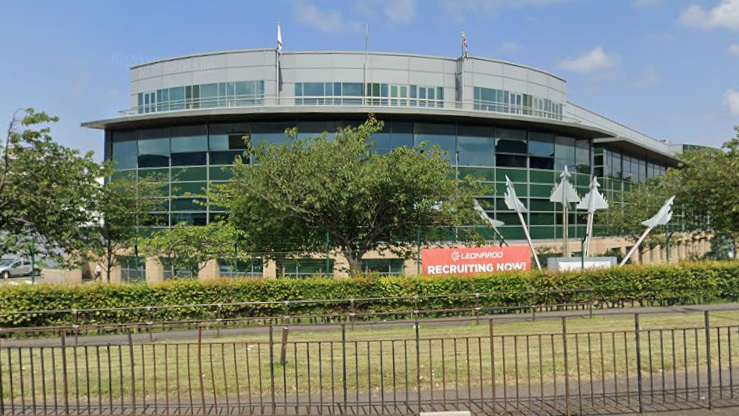Engineer used 'secret toilets' after trans colleague encounter

Maria Kelly is taking legal action against Leonardo UK
- Published
An engineer began using a "secret toilet" at her workplace after encountering a transgender colleague in the female bathrooms, an employment tribunal has heard.
Maria Kelly is taking legal action against aerospace company Leonardo UK, which has an office in Edinburgh.
Ms Kelly has lodged a complaint alleging harassment as well as direct and indirect discrimination.
She told a tribunal that, as someone who suffers from heavy periods, female toilets were important to her as a place of refuge.
Ms Kelly, who works as a people and capability lead in the company's electronics department, said: "In March 2023 I was walking out of the toilet and one of my trans identifying male colleagues walked in and I was a little taken aback.
"I didn't say anything, I just said 'hi' and walked out.
"I had just been washing blood off my hands so I was genuinely quite taken aback so I then started using what we refer to as the secret toilets.
"They are secret because they are tucked away."
She told the Edinburgh tribunal: "I don't know any man who knows about them.
"I know women who use them because of the increased privacy."
More news from Edinburgh, Fife and East
Ms Kelly said she had first become aware of a transgender person using the female toilets in 2019 when a member of staff from another UK office came to Edinburgh.
She recalled how female colleagues who told her about it seemed "genuinely upset".
Ms Kelly said she did not raise the issue with the company at the time as she feared being labelled "transphobic" or being put on the "naughty list".
The tribunal heard that in 2023 she became aware that, for a period of six to nine months, there were three people that she suspected were transgender but one had since left the company.
They were referred to as A, B and C.
Ms Kelly said she assumed they had been told they could use the ladies' toilets in her office building.
She said she was later told there were two transgender people at the company.
Ms Kelly's lawyer Naomi Cunningham asked: "How did it make you feel to know they were using the toilet?"
She replied: "It was running into person B as I was coming out of the toilet that made me think: 'We are going to have to stop this. I am not going to sacrifice my privacy, my dignity, sharing the toilet with a man.'
"I think within a day or two I had a conversation with my line manager."
Ms Kelly believed this was March 2023 and added: "I wrote to my line manager, asking: 'Can you confirm if we have a toilet policy and if the policy is on the basis of sex or gender?"'
In April, the UK Supreme Court ruled that a woman is defined by biological sex under equalities law.
'Secret squirrel toilets'
Ms Kelly told the tribunal that in April 2024 she received a message from someone within the company.
They told her the policy was that anyone who self-identified as a woman could use the ladies' toilets.
She also said that, in October 2024, the female sign was removed from the "secret squirrel toilets" and was replaced with a WC badge.
Ms Cunningham asked Ms Kelly for her understanding of what constituted a man and a woman.
She replied: "It's always been related to sex, so it's the sex that you were born.
"So if you were born male you remain male and if you were born female you remain female."
Asked whether she believed it was possible for a human being to change sex, Ms Kelly replied: "No."
Ms Kelly also told the inquiry that she began grievance proceedings about the toilet issues and had to discuss the matter in a room with three men.
The witness became emotional as she recalled: "I couldn't believe that I had to sit in a room and justify why dealing with menstruation is a specific issue that women need privacy and dignity about, and then have to explain the consequences of menopause and the unpredictable nature of perimenopausal symptoms."
The tribunal, taking place before employment Judge Sutherland, continues.